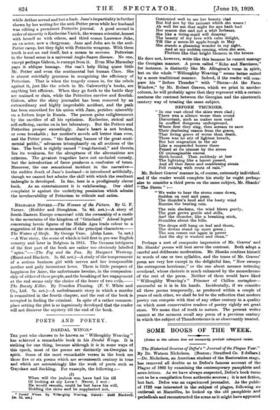POETS AND POETRY.
DAEDAL WINGS.*
Tax poet who chooses to be known. as " Willoughby Weaving" has achieved a remarkable book in his Daedal Wings. It is striking for one thing, because although it is in some ways of tbia epoch, most of the poems are distinctly un-Georgian in
spirit. Some of the most remarkable verses in the book are those five or six poems which are seventeenth century in tone and which are astonishingly like the work of poets such as
crayshaw and Suckling. For example, the following k—
(I) When will the jealous sun have had his fill Of looking at my Love f Never, I wet : He would remain, could he but have his will, Holding the skies and be supplanted not,
• Daecial Winos. By Willoughby Weaving. oxford Said niackien. (411- ed. net.]
Contented well to see her beauty clad But hid not by the raiment which the wears ! Ah well for me that night for aye hath had Her season due and not a whit forbears.
She like a tiring-maid will disarray The beauty of my love with calm delight, Till like a moon-lit apple-bough in May She stands a gleaming wonder in my sight, Arid- at my Buckle* coming, when she sees, Flutters like that bright blossom in the breeze.
He does not, however, write like this because he cannot manage the. Georgian manner. A poem called Echo and Narcissus," for instance, is distinctly like Mr. Alliugton'a verse in spirit, but. on the whole " Willoughby Weaving " seems better suited by a, more traditional manner. Indeed, if the reader will com- pare his " Before Thunder " with " Storm—At the Farm Window," by Mr. Robert Graves, which we print in another column, he will probably agree that they represent with a certain neatness the contrast between the. Georgian and the nineteenth century way of treating the same subject.
BEFORE THUNDER.
" In one vast cloud the skies were clad ;
Thera was silence worse than sound
Discordant, such as makes men mad In muffled dungeons underground,
Where first they sing, then scream to save
Their deafening reason from the. grave, That living grave of worse than death. There was no stir of lightest ;breath, But hot stagnation in the air Like a suspended horror there Poised at its utmost by the stress Of unimaginable, excess Birth-bound. Then suddenly at last The lightning like a lancet passed, Anti an that fierce and maddening strain
Fell ruining with routs, of rain."
Mr. Robert Graves' manner is, of course, extremely individual, and if the reader would complete his study he ought perhaps also to consider a. third poem on the same: subject, Mr. Shanks' " The Storm " We wake to hear the storm come down, Sudden Oa reef and pane. The thunder's loud and the hasty wind Hurries the beating rain.
The rain slackens, the wind blows gently, The gust grows gentle and stills, And the thunder, like a breaking stick, Stumbles about the hills.
The drops still hang on leaf and thorn, The downs stand up more green ; The sun comes out again in power And the sky is washed and clean."
Perhaps a sort of composite impression of Mr. Graves' and Mr. Shanks' poems will best serve the contrast. Both adopt a careful and deliberate moderation. Mr. Shanks confines himself to words of one or two syllables, and the tones of Mr. Graves' poem are very low except in the delightful line, " Now swoops the outrageous hurricane," or the one about menace tottering overhead, whose rhetoric is much enhanced by the monochrome of the rest of the poem. Neither of them would have liked " Willoughby Weaving's " Prisoner of Chinon metaphor— successful as it is in his hands. Incidentally, if we consider all three poems temporarily, as produced within a couple of years of each other, we shall be led to the reflection that modern poetry can compete with that of any other century in a quality on which most conservative readers of poetry rightly set great store. We mean that of truth to nature. The present writer cannot at the moment recall any poem of a previous century in which the subject of Thunderstorms is so observantly treated.






































 Previous page
Previous page